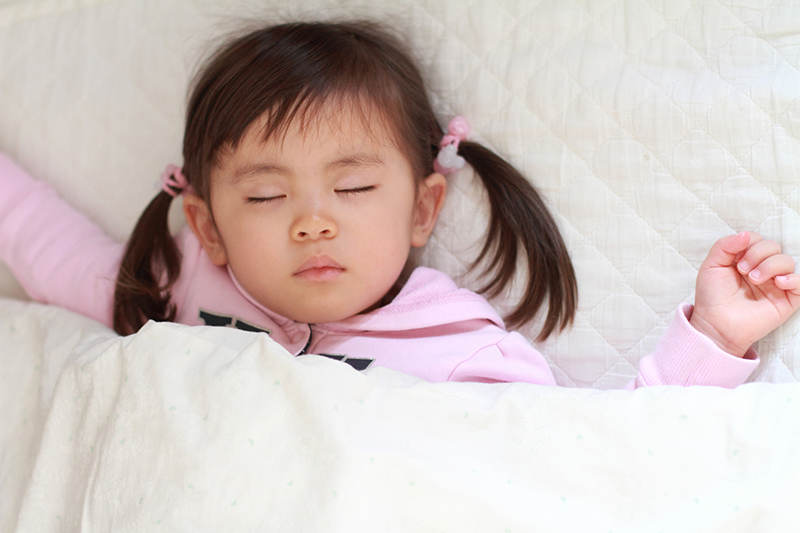Families For Life | Toddler Sleep: What to Expect

Toddlers need 10-12 hours sleep a night. Most toddlers can do with an hour or two of sleep in the middle of the day as well. Here’s what to expect from toddler sleep.
Toddler sleep: what you need to know
Once asleep, most toddlers sleep through most nights without waking mum or dad. But toddlers love to test their independence, so getting them to bed in the first place can be a challenge.
Young children also get overtired easily. When they do, they find it harder to get to sleep. Once you can spot your child’s signs of tiredness, you’ll be able to settle him to sleep before grumpiness sets in. A firm and consistent bedtime routine will be a big help.
Understanding sleep and sleep patterns is an important starting point for helping your child develop healthy habits and a positive attitude towards sleep.
Toddler sleep schedule
A common daily sleep schedule for toddlers might look like this:
7 am: wake up
1 pm: nap of no more than 2 hours
3 pm: wake up
7 pm: bedtime
If your toddler’s day nap is too long or too late in the day, your child might not be ready for bed until late at night.
Some toddlers like to wake at 5.30 am or 6 am. There isn’t much you can do about this. Putting your toddler to bed later at night in the hope of later waking in the morning doesn’t tend to work. Your toddler might still wake up early then be grumpy from too little sleep.
If you live with an early riser, you might want to move your bedtime forward too.
Toddler bedtime routine
A consistent bedtime routine helps prepare toddlers for sleep.
Most toddlers are ready for bed between 6.30 pm and 7.30 pm. This is a good time, because they sleep deepest between 8 pm and midnight. It’s important to keep the routine consistent on weekends as well as during the week.
A bedtime routine might look something like this:
6.30 pm: brush teeth and change diaper
6.45 pm: quiet time (read a book or tell a story)
7 pm: into bed and kiss goodnight
Before you turn out the light, it’s a good idea to do a quick check of your child’s room to make sure her sleeping environment is safe.
If your child takes a pacifier to bed, you might consider encouraging him to let go of the pacifier.
Taking a bottle of milk to bed isn’t a good idea either, because it can cause tooth decay and lead to more problems with sleep. It’s better for your child to finish her milk at least 30 minutes before going to bed.
Calling out and getting up after bedtime
Your toddler might go through a stage of calling out or getting out of bed after you’ve said goodnight.
Try these tips:
Avoid boisterous play before bedtime. This can make it harder for your child to settle.
Turn off the TV, computers and tablets an hour before bedtime, and avoid letting your child watch scary or exciting things close to bedtime.
Set up a consistent, calming bedtime routine.
Before leaving your child’s bedroom, check that your child has everything he needs. Remind your child to stay quietly in bed.
If your toddler shares a bedroom with a brother or sister, you might need to delay your other child’s bedtime by half an hour until your toddler is settled and asleep. If you’re firm and consistent, your toddler will quickly get the message that bedtime is for sleeping.
It’s worth checking whether your child actually needs something when she calls out. If your child has done a poo, change the diaper with the lights dim and no talking. If your child is scared of a monster under the bed, a quick check by you (with the light off) can confirm the room is monster-free. If your child is scared of the dark, think about using a night-light.
Night terrors
A night terror is when your child suddenly gets very upset while sleeping deeply. Night terrors can be scary for you, but they don’t hurt or scare your child.
Lack of sleep can cause night terrors in some children. If you think your child isn’t getting enough sleep, a positive bedtime routine might help.
A night terror can last from a few minutes up to 40 minutes.
Moving to a ‘big bed’
Most children move from a cot to a bed when they’re around 2-3½ years old. But there’s no hurry, particularly because some young toddlers might try to get out of bed more often.
You might need to move your child if your child has started climbing out of the cot or needs to use the potty at night, or if you need the cot for a new baby.
Teeth-grinding
Many children grind their teeth at some stage. Children won’t usually be woken up by the sound of their own teeth-grinding – but other people in the room might be!
Getting help
Sleep medications aren’t usually the solution to children’s sleep problems – there are better ways to deal with these difficulties.
In fact, children’s sleep problems are one of the most common reasons that parents seek help from professionals. Your child’s sleep problems will be much easier to manage with the support of a trusted child health professional.
© raisingchildren.net.au, translated and adapted with permission
Explore more